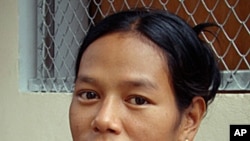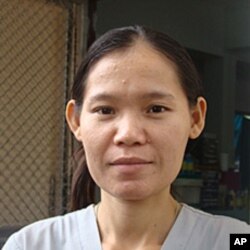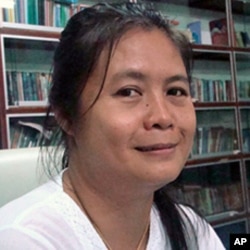A clinic in Thailand that has served refugees from Burma for two decades is seeing increasing demand for its services.
It is another busy morning at the Mao Tao clinic in the northwestern Thai border town of Mae Sot. Newborns cry as mothers and friends offer support.
This clinic offers a range of services - immunizations, tuberculosis drugs, minor surgery, in-patient care. It even offers prosthetic limbs to refugees who have been victims of the landmines left from decades of ethnic conflict in Burma.
Dr. Cynthia Muang, one of thousands to flee Burma after the military's 1988 crackdown on pro-democracy forces, set up the clinic 20 years ago.
It now treats more than 150,000 patients a year, and demand is rising as health services in eastern Burma deteriorate.
Half of the clinic's patients cross over from Burma for treatment and then go home. The remainder are among the tens of thousands of Burmese citizens who work in Thailand, in factories or on farms.
Waiting outside the delivery room, Myint Myint Moe, 24, a farm worker in Thailand, prepares for the birth of her child.
Myint Myint says she is happy to come to the clinic because for migrant workers there is nowhere else to go. She says she is hoping for a girl.
Eh Poh, a midwife who advises women on ante-natal health, says the clinic's role goes beyond delivering babies, to teaching women basic health care.
"When I arrived we had delivery already two to three women - normal delivery without complication, also one in labor now ready. We [also] give education to the women who already delivery; how to take care of the baby, breastfeeding. We have to give education like in nutrition. Sometime they believe that when they are pregnant they cannot eat like some vegetable," Eh Poh explaines.
Last year, the clinic delivered almost 3,000 babies, and 9,000 new mothers received care.
Terry Smith is an American doctor at the clinic. He says Burma's weak health care system means many of the women suffer from serious underlying illnesses.
"A very high incidence of malaria and malaria is bad for pregnancies. It causes fetal loss, miscarriages; it causes severe anemia which makes it very difficult for the women," he said. "The other problem is that a lot of women lose their pregnancies because of malnutrition, because of infection, because of poor family planning, and they have short child spacing, spontaneous miscarriages."
Smith, who has worked in Latin America and South Asia, says the thousands of people internally displaced due to fighting in eastern Burma between the army and ethnic groups means health services are run down or non-existent.
"There is no good health system in Burma - at least in eastern Burma. The people that come here - there's no public health, there's no mosquito control, there's no sanitation, there's no clean water, there's no hospitals, there's nothing," Smith says, "People have to fend for themselves and they depend upon getting help from other people."
The clinic works in close partnership with Thai medical services, and sends patients to hospitals in the northern city of Chiang Mai for major surgery.
But the charity is struggling to meet growing needs. The global economic slowdown led donors to cut funding.
Eh Thwa, a spokeswoman for the clinic, says the growing demands and funding shortfalls place more pressure on the clinic. "Every year we see more patients. Also we have three main activities; we look after the sick patient, the second is [medical] trainee program for [people in] Burma or in the refugee camps; also child protection - we have a boarding house - a school," Eh said.
Major surgery, such as those for congenital heart problems, taken for granted in the West, is beyond the reach of many Burmese who reach the clinic.
Families often sell their homes to pay for a child's operation in Burma only to receive inadequate treatment. With no option left, families take the sometimes dangerous trip to Thailand so a child can receive care through the clinic.
The doctors at the clinic say there are fears that after Burma holds its first elections in 20 years, on November 7, the military government may crack down on rebellious ethnic groups or dissidents. That could send even more refugees across the border, and many of them will need medical care.






